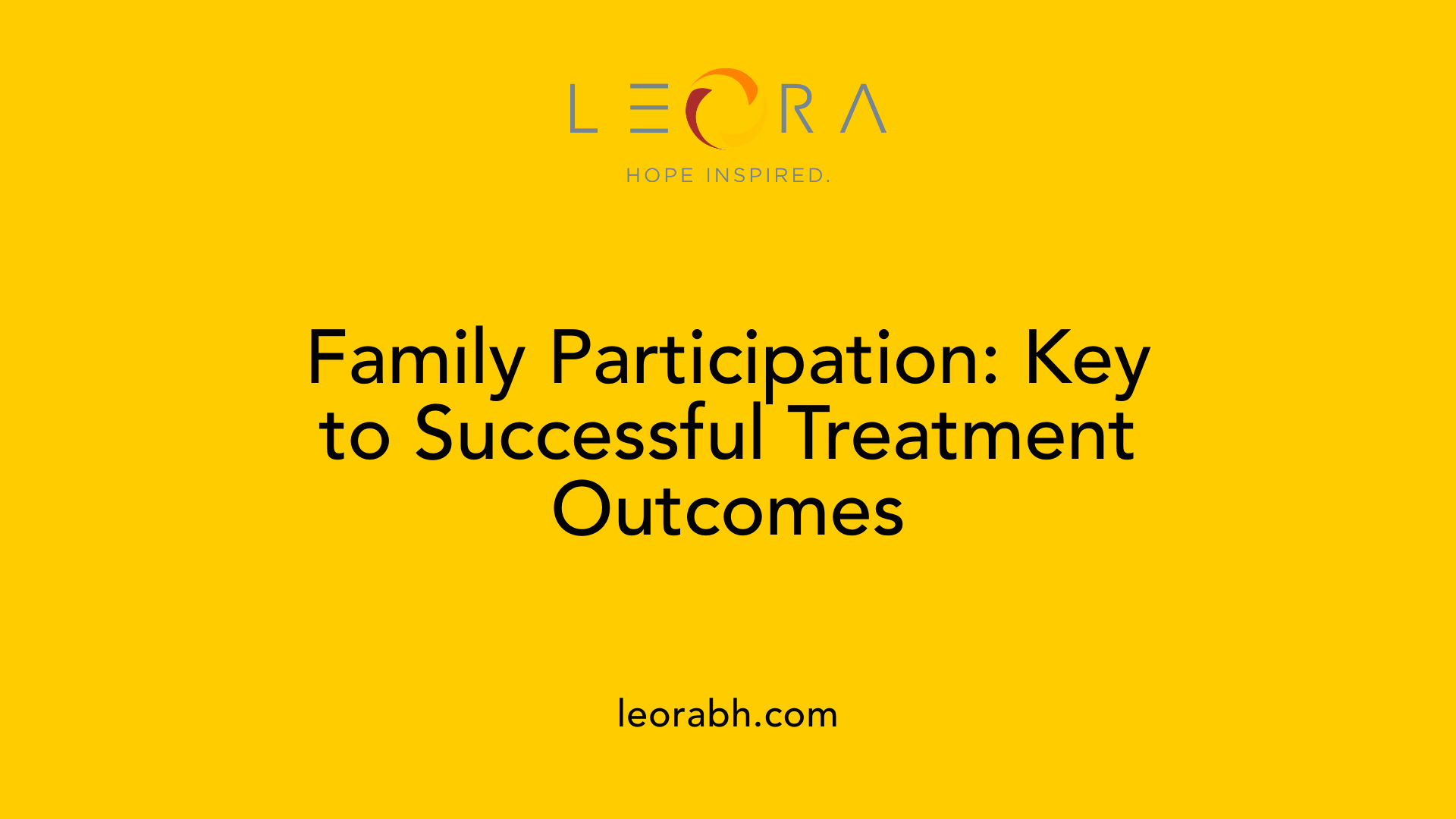How to involve your family in your recovery process
Building a Supportive Foundation for Recovery
Understanding the Power of Family in Addiction Recovery
Family involvement is a cornerstone of effective addiction recovery, offering emotional stability, practical assistance, and an environment conducive to lasting change. Recognizing the critical role families play can significantly improve recovery outcomes by fostering understanding, support, and coordinated efforts between loved ones and treatment professionals.
The Crucial Role of Family in Recovery

What is the role of family in recovery?
Family members have a fundamental part to play in addiction recovery. Their involvement helps create a supportive environment that promotes healing and resilience. Families can offer emotional solace by listening non-judgmentally and understanding the complexities of addiction. Practical support includes helping access treatment services, participating in therapy sessions, and assisting in planning recovery strategies.
Engaging in open conversations, setting healthy boundaries, and fostering honest communication are essential. Family therapy sessions teach healthier interaction patterns, address underlying issues like trauma, and help rebuild trust. Family members often serve as accountability partners, providing motivation and celebrating progress, which reinforces positive changes and long-term commitment.
Moreover, a healthy family environment reduces stress and minimizes triggers that could lead to relapse. Family support also involves participating in mutual support groups such as Al-Anon, which connect loved ones with shared experiences and resources. Overall, families working together with professionals greatly enhance the chances for sustained sobriety and emotional well-being.
Supporting Loved Ones: Practical Strategies for Families

How can family members support a loved one in recovery?
Families often want to help their loved ones overcome substance use disorders, but knowing how to do so effectively can be challenging. Supporting a loved one involves a combination of education, active participation, and ongoing encouragement. One of the most impactful ways is to participate in the treatment process with the patient's permission. Attending appointments, such as intake sessions or family therapy, allows family members to better understand addiction and recovery, and to learn ways to support their loved ones.
Engaging in mutual support groups like Al-Anon or Nar-Anon can provide emotional support and practical advice. These groups connect family members with others who have similar experiences, fostering a network of understanding and shared strategies. Family members can also leverage community resources and programs, such as those offered by OASAS, to access educational materials, counseling, and support services tailored for families dealing with addiction.
Creating a stable, supportive environment at home is equally important. This involves setting healthy boundaries, avoiding enabling behaviors, and encouraging healthy routines and sobriety-friendly spaces. Families should also focus on fostering open, non-judgmental communication, which can help their loved ones feel safe and understood during their recovery journey.
Knowing that addiction is a chronic disease with a lifelong component can help families maintain patience and compassion. Support from the family acts as a foundation that bolsters a person's motivation and accountability, increasing the chances of successful long-term recovery.
In essence, families contribute significantly by staying informed, involved, and empathetic—transforming their support into a powerful force for positive change.
| Strategy | Description | Additional Notes |
|---|---|---|
| Participate in treatment planning | Engage with treatment providers with the patient's consent | Improves treatment adherence and understanding |
| Attend support groups | Join groups like Al-Anon or family sessions | Provides emotional support and shared experiences |
| Educate oneself about addiction | Learn about symptoms, treatment, and recovery processes | Empowers families and reduces misconceptions |
| Create a supportive environment | Offer encouragement and reinforce positive behaviors | Helps sustain motivation and sobriety |
| Set healthy boundaries | Establish limits to avoid enabling behaviors | Essential for protecting family well-being |
By incorporating these strategies, families can play an essential role in their loved ones’ recovery, offering hope, stability, and unwavering support.
Facilitating Treatment Through Family Involvement

How can family involvement facilitate treatment and recovery?
Family plays a crucial role in the recovery process from substance use disorders (SUDs). Their participation not only provides emotional support but also creates a more stable environment for the individual in treatment. Engaged families can attend therapy sessions, support ongoing recovery efforts, and advocate for their loved ones as they navigate treatment options.
Family members can help ensure adherence to treatment plans by encouraging healthy routines and monitoring for signs of relapse or mental health issues. Their presence during appointments and participation in family therapy strengthen communication, rebuild trust, and address underlying family dynamics that might contribute to substance misuse.
Recognizing early warning signs—such as mood changes, behavioral shifts, or withdrawal—is vital. Families trained in understanding these signs can seek prompt intervention, preventing setbacks.
Furthermore, participating in mutual support groups like Al-Anon encourages family members to share experiences, learn coping strategies, and feel less isolated. These groups foster a network of support, which enhances the family’s capacity to provide ongoing encouragement and accountability.
Research supports that family-involved treatment approaches improve retention, reduce relapse rates, and promote better long-term outcomes for individuals recovering from addiction. Overall, involving family creates a supportive, understanding, and proactive environment that significantly boosts the chances of sustained recovery.
Benefits of family participation in therapy
| Benefit | Description | Additional Notes |
|---|---|---|
| Improved communication | Family therapy helps open lines of dialogue and resolve conflicts | Focus on honest, non-blaming conversations |
| Strengthened relationships | Rebuilding trust and understanding within the family | Reconciliation and emotional bonding |
| Increased accountability | Family can provide motivation and oversight | Encourages adherence to treatment plans |
| Addressing family roles | Therapy examines roles like caretaker, scapegoat | Promotes healthier interaction patterns |
| Support system development | Families learn to offer ongoing support | Connects families with community resources |
Early recognition of relapse signs
| Sign | Typical Observation | Recommended Action |
|---|---|---|
| Mood swings | Sudden depression or irritability | Seek counseling or check-in with support group |
| Behavioral changes | Isolating, secretive, or risky activities | Increase engagement, consider therapy |
| Physical signs | Withdrawal from activities, appearance changes | Medical evaluation or detox if needed |
| Cravings | Expressing urges or preoccupation with substances | Reinforce coping strategies, seek professional help |
| Stress or triggers | Situational stress, relationship conflicts | Develop coping plans with family support |
Enhancing communication and trust
Building honest, respectful communication is essential in family-involved recovery. Using 'I' statements during discussions about concerns helps avoid blame and promotes understanding. Setting clear boundaries and respecting each other's privacy and feelings fosters a safer environment.
Regular family meetings and participation in educational sessions or family therapy strengthen bonds and improve the overall family dynamic. These efforts help address misunderstandings, resolve conflicts, and rebuild trust.
Involving family members in recovery planning and decision-making empowers everyone, making the process more collaborative. By fostering empathy, patience, and openness, families can support their loved one more effectively throughout their journey.
Strategies for Effective Family Engagement
How can families be better educated about addiction?
Educating families about addiction is a foundational step in engaging them effectively. Family programs and therapy sessions often include psychoeducation components that help loved ones understand the nature of substance use disorders. Learning about addiction symptoms such as cravings, control issues, withdrawal, and the importance of ongoing treatment enables families to recognize signs of relapse and respond appropriately.
Family education also addresses misconceptions and stigma, fostering empathy and compassion. When families understand that addiction is a complex, treatable disease rather than a moral failing, they are better equipped to support their loved ones without judgment. Resources like support groups (e.g., Al-Anon, Nar-Anon) and educational materials from treatment providers serve as vital tools in increasing knowledge.
Understanding the dynamics of change and the stages of recovery can help families respond with patience and realistic expectations. This education often covers how to create a supportive, sober environment—such as removing alcohol or drugs from the home and encouraging healthy routines.
What are effective practices for maintaining open communication?
Open communication is crucial for fostering trust and understanding within families dealing with addiction. Techniques such as using ‘I’ statements (e.g., "I feel worried when..."), active listening, and avoiding blame are effective strategies.
Family members are encouraged to share their feelings honestly while maintaining respect and empathy. Regular family meetings and therapeutic sessions help facilitate this exchange. It's important for families to set a tone of nonjudgment and support, making it clear that their goal is collaboration and recovery.
Families should also learn to handle difficult conversations about sensitive topics, such as relapse or behavioral issues. Setting boundaries during discussions prevents harmful blame-shifting and preserves emotional safety.
How do setting boundaries and managing expectations support recovery?
Boundaries are vital in establishing a healthy family environment and supporting recovery. Clear guidelines about acceptable behavior, communication limits, and privacy help prevent enabling behaviors and power struggles.
Setting boundaries might include defining what is acceptable regarding substance use, financial management, or social interactions. These boundaries protect both the individual in recovery and the family’s emotional well-being.
Managing expectations involves understanding that recovery is a non-linear process. Setbacks and relapses are common, and being patient and adaptable is necessary. Families are encouraged to celebrate progress while remaining realistic about challenges.
Effective boundary setting and expectation management help reduce stress, improve relationships, and foster an environment conducive to long-term recovery.
| Strategies | Practical Examples | Benefits |
|---|---|---|
| Education about addiction | Attend family education sessions, read resources on addiction | Empowers families, reduces stigma |
| Open communication | Use ‘I’ statements, hold regular family talks | Builds trust, resolves conflicts |
| Boundaries & expectations | Define behaviors, set clear rules, accept setbacks | Prevents enabling, promotes recovery |
| Support groups participation | Join Al-Anon, family support meetings | Offers ongoing support, shared experiences |
This integrated approach—covering education, communication, boundary-setting, and ongoing support—strengthens family involvement in recovery, improving outcomes and fostering healing within the family system.
The Benefits of Family Therapy and Support Groups
What are the benefits of family involvement in treatment?
Family involvement plays a crucial role in the recovery process from substance use disorders. When families actively participate in treatment, it fosters better communication, helps rebuild trust, and addresses underlying issues such as trauma and mental health disorders that may contribute to addiction.
Family therapy approaches are designed to improve relationships and promote healthier interactions. Techniques such as solution-focused therapy and psychoeducation help family members understand addiction better, recognize destructive patterns, and learn coping strategies. These methods encourage collaborative efforts to maintain a supportive environment for recovery.
Support groups like Al-Anon and Nar-Anon are valuable resources for families. They offer a safe space for members to share experiences, obtain emotional support, and learn from others navigating similar challenges. These groups help reduce feelings of isolation and provide practical advice on establishing healthy boundaries and supporting loved ones effectively.
Overall, engaging families in the recovery process creates a resilient support network. This strengthens the emotional fabric of the family, increases motivation for treatment adherence, and sustains long-term recovery for the individual. Such collective support fosters healing, improves relationships, and promotes a healthier family environment.
How do family therapy approaches promote recovery?
Family therapy approaches target the dynamics within the family that influence substance use and recovery. Methods like functional family therapy and psychoeducation focus on understanding family roles, communication flaws, and behavioral patterns.
Therapies aim to educate family members about addiction, helping them break free from enabling behaviors and develop healthier coping skills. They also work to repair relationships damaged by addiction and to establish clear boundaries that support sobriety.
Through these approaches, families learn how different roles—such as caretaker, scapegoat, or lost child—can unconsciously perpetuate unhealthy patterns. Addressing these roles helps foster a more supportive environment conducive to recovery.
What role do peer support groups play?
Peer support groups provide ongoing emotional sustenance and a sense of community for family members impacted by a loved one’s addiction. Attending meetings alone or with their loved ones allows families to share their experiences, gain insights, and learn new strategies for coping.
These groups emphasize shared understanding and collective resilience. Members can discuss challenges they face, celebrate successes, and access educational resources that enhance their caregiving and advocacy roles.
Participation in these groups can also increase motivation, reduce stress, and improve emotional well-being, which directly benefits the recovery journey.
How does healing family relationships impact recovery?
Rebuilding relationships is fundamental to long-term recovery success. When families address communication issues and familial trauma collectively, they create a supportive environment that encourages accountability and openness.
Healthy family relationships motivate ongoing engagement in treatment, reduce relapse risks, and help the recovering individual feel valued and understood. Healing efforts often include addressing underlying conflicts, setting healthy boundaries, and fostering forgiveness.
In summary, family therapy and support groups are powerful tools that facilitate healing and strengthen the family unit, ultimately supporting sustained recovery and improving overall family health.
| Aspect | Focus | Benefits | |---------|--------------|--------------------------------------------------| | Family therapy approaches | Communication, relationship repair | Rebuilds trust, identifies patterns, promotes healthier interactions | | Peer support groups | Sharing, emotional support | Decreases isolation, fosters resilience, provides practical advice | | Healing family relationships | Rebuilding trust, setting boundaries | Enhances motivation, reduces relapse, creates a supportive environment |
Understanding these aspects underscores the importance of involving families in the recovery process and highlights how comprehensive support can significantly enhance treatment outcomes.
Continuing Support After Treatment and Overcoming Challenges
How can ongoing family involvement support long-term recovery?
After the initial phase of treatment concludes, the role of family support remains vital in ensuring sustained recovery. Families that maintain active engagement can effectively monitor early signs of relapse, which allows for timely intervention and support. Continuing education about addiction and recovery strategies helps families stay informed about best practices and how to reinforce positive behaviors.
Participation in virtual support networks, such as online groups or educational webinars, provides ongoing learning and community connection. These platforms also create opportunities for families to share experiences, seek guidance, and find emotional support. Family therapy sessions conducted post-discharge aim to address lingering relational issues, rebuild trust, and develop strategies to handle stressors that could trigger relapse.
Addressing setbacks with compassion is essential. Relapses are common in recovery and should be seen as part of the process rather than failures. By approaching setbacks with understanding and without blame, families can foster an environment of resilience and motivation.
Long-term recovery is strengthened through a consistent, supportive household environment. This includes setting healthy boundaries, encouraging healthy routines, and supporting individual recovery goals. Family members’ ongoing involvement, encouragement, and understanding significantly reduce the risk of relapse and promote emotional stability.
In sum, a supportive family environment that remains engaged, educated, and compassionate plays a crucial role in maintaining sobriety and well-being over the long term. This sustained involvement helps create a foundation of stability and hope, essential for lasting recovery.
Building a Lasting, Supportive Family Environment
Involving your family in the recovery process is a powerful step toward achieving enduring sobriety and emotional well-being. Through education, open communication, therapy, and ongoing support, families can create a resilient environment that fosters healing and mutual understanding. Embracing these strategies not only benefits the individual in recovery but also strengthens family relationships, enabling everyone to move forward together with hope and confidence.
References
- Retention Toolkit: Family Involvement - UW ADAI
- Understanding & Supporting a Loved One's Recovery
- Family Roles in Addiction & the Importance of Family Support in ...
- Chapter 3—Family Counseling Approaches - NCBI
- Mental Health Coping Resources for Children and Families - SAMHSA
- How Family Involvement Enhances Addiction Recovery
- The Role of Family Support in Outpatient Addiction Treatment
- Family: How You Talk About Recovery
- Family Involvement in Substance Abuse Treatment - Wellbridge
- How to Help an Alcoholic Family Member – 8 Essential Steps
Find Your Inner Light
Related Articles
Schedule an Assessment
Leora Behavioral Health provides comprehensive treatment services, including ambulatory detox, mental health IOP, and SUD IOP, to support your journey toward lasting recovery.
Our caring team will guide you through the admissions process and create a personalized treatment plan tailored to your unique needs. We welcome walk-ins. If you or a loved one is struggling, reach out today. We’re here to help.


.svg)




.svg)
.svg)
.svg)
.svg)
